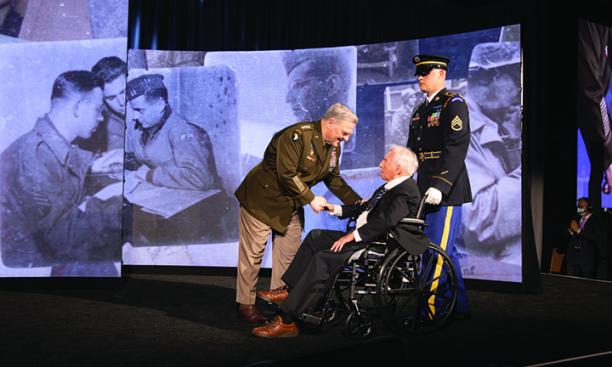
When emeritus professor Arno Mayer joined the U.S. Army in 1944, he wanted to serve his adopted country. He did not anticipate that doing so would involve taking some of the top Nazi rocket scientists Christmas shopping.
Mayer was one of the famed Ritchie Boys, European-born U.S. soldiers who trained in counterintelligence at Camp Ritchie in Maryland. (Fellow Princeton professor Victor Brombert was another.) In May, he represented the surviving Ritchie Boys at the U.S. Holocaust Memorial Museum in Washington, D.C., as they were honored with the Elie Wiesel Award, the museum’s highest honor. Gen. Mark Milley ’80, chairman of the Joint Chiefs of Staff, delivered the keynote address.
Born in Luxembourg, Mayer and his family fled the Nazis and emigrated to the United States in 1941. Just days before V-E Day, he was assigned to Camp Ritchie, where several hundred soldiers with European backgrounds had worked interrogating German POWs. When the war in Europe ended, Mayer was assigned to an equally secret project, known as Operation Paperclip, at Camp Hunt in Virginia, where Wernher Von Braun and other captured V-2 scientists had been transported as the United States tried to ensure that their knowledge would not be passed to the Soviet Union. The site was so secret that it was known only by its address, P.O. Box 1142, and the windows on the bus taking Mayer and his fellow soldiers there were covered with plywood.
“As a Jewish refugee from Europe, that was about as big an assignment as you could get,” Mayer recalls in Camp Confidential, a 2021 Netflix animated documentary about Operation Paperclip. The film won a Critics Choice award and was shortlisted for an Oscar.
Mayer was named “morale officer”; his responsibilities included providing the German scientists with liquor, cigarettes, and whatever else was needed to keep them happy. Cozying up to people he viewed as war criminals was difficult, but Mayer did his duty. “It was unpleasant, to put it mildly,” he says in the film.
The Germans, in turn, referred to Mayer as “the little Jew boy” behind his back, but Mayer exacted revenge where he could. When they asked to be taken Christmas shopping to buy gifts for their wives back in war-ravaged Germany, Mayer deliberately took them to a Jewish-owned department store in Washington. One of the items on their shopping list was underwear. Mayer took them to the lingerie department, where a salesclerk showed them a selection of lacy nylon panties. “Good heavens, no!” Von Braun barked back, in German. “Made of wool and with longer legs!”
Like others stationed at P.O. Box 1142, Mayer was sworn to secrecy; the U.S. government did not even reveal the existence of Operation Paperclip until the early 2000s. When his parents asked what he was doing, Mayer would reply archly, “I am preparing the Third World War.” Thanks in part to their work, however, German rocket technology did not fall into Soviet hands, and Von Braun was later instrumental in developing the U.S. space program.
At the Wiesel ceremony, Mayer, now 95, and another ex-Ritchie Boy, Gideon Kantor, were escorted to the stage by members of the Third Infantry, which traditionally escorts the president to state functions. In his remarks, Milley noted that he took Mayer’s European history class as a Princeton undergraduate and received a B- (“though it should have been an A,” the general quipped). Turning serious, Milley remarked that, as members of the U.S. armed forces, Mayer and his comrades “swore an oath to a document, to the Constitution of the United States of America. And that is an idea that the Ritchie Boys were willing to die for, the idea that is America.”
After being discharged from the Army in July 1946 and receiving a good-conduct medal for his service, Mayer went on to earn a Ph.D. at Yale and joined the Princeton faculty in 1962, where he earned recognition as one of the leading scholars of postwar European history. Although Mayer had hoped to fight Nazis, says his son, Carl Mayer ’81, “He came to realize that the intelligence they gathered saved thousands of lives and that they had done a great deal of good.”
